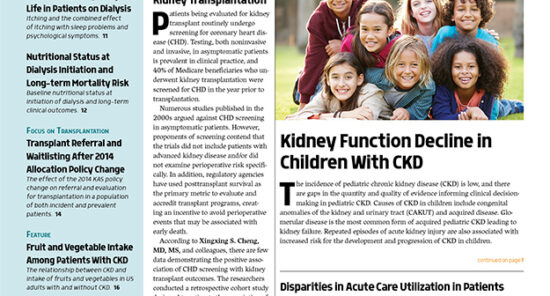Credit: Original article published here.Patients with glomerular disease may experience acute medical complications such as anasarca, infections, acute kidney injury, thromboembolism, and cardiovascualr events that require utilization of acute care (emergency department [ED] visit or hospitalization). In addition, patients with glomerular disease being treated with immunosuppressive therapies commonly experience infections that can result in utilization of acute care. According to Jill R. Krissberg, MD, MS, and colleagues, the risk of utilization of acute care may be affected by race, ethnicity, and socioeconomic status (SES). The researchers conducted a prospective cohort study designed to compare rates of acute care utilization across racial and ethnic groups in adults and children with glomerular disease in the CureGN (Cure Glomerulonephropathy) cohort. They sought to test the hypothesis that rates of acute care utilization would be increased among Black or Hispanic patients but that lower SES and more severe glomerular disease in those groups would explain any observed differences. Results of the study were reported in the American Journal of Kidney Diseases [2023;81(3):318-328]. The study cohort included 1456 adults and 768 children with biopsy-proven glomerular disease enrolled in the CureGN cohort. The study exposure was race and ethnicity as a participant-reported social factor. Race and
Credit: Original article published here.The incidence of pediatric chronic kidney disease (CKD) is low, and there are gaps in the quantity and quality of evidence informing clinical decision-making in pediatric CKD. Causes of CKD in children include congenital anomalies of the kidney and urinary tract (CAKUT) and acquired disease. Glomerular disease is the most common form of acquired pediatric CKD leading to kidney failure. Repeated episodes of acute kidney injury are also associated with increased risk for the development and progression of CKD in children. The most comprehensive data on the progression of CKD in children are from the Chronic Kidney Disease in Children (CKiD) study, an ongoing prospective cohort study that has enrolled more than 1000 children over three recruitment waves. According to Caroline A. Gluck, MD, and colleagues, CKiD data are limited by the relatively small sample size. The researchers conducted a study utilizing electronic heath record (EHR) data from a national multicenter pediatric network in the United States to identify a large cohort of children with CKD. The retrospective cohort study was designed to evaluate progression of CKD in the pediatric population and examine clinical risk factors for decline in kidney function. Results of the study were



